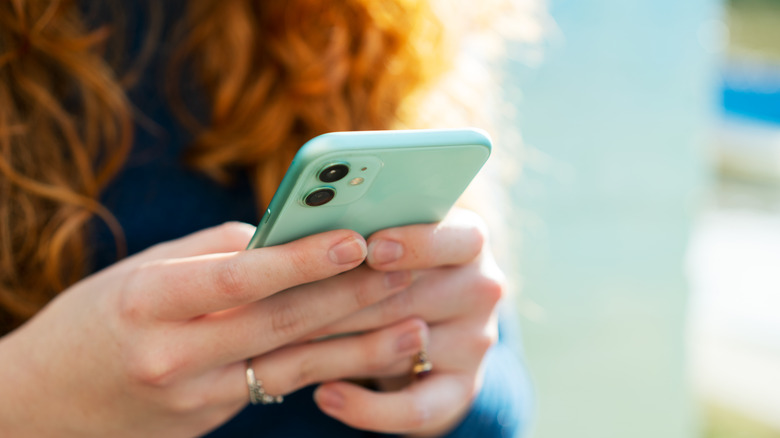Why The Sadfishing Trend Could Be Dangerous For Your Mental Health
Online accounts are more than just places where you share your personal best "highlight" reels. It's also where you talk about emotional lows. While not all such sharing is concerning, some are signs of unhealthy social media behaviors. Cue sadfishing, a term first coined by a journalist by the name of Rebecca Reid in 2019, in response to a post by model and media personality Kendall Jenner. In the Instagram post, Jenner seemed to have alluded to dealing with a deeply exhausting skincare problem, only to later reveal that the post was related to a promotion she was doing for Proactiv's new pimple cream. (It is important to note, however, that the celebrity has spoken about her acne struggles before.)
Even so, sadfishing has become a mental health phenomenon that's intrigued experts. Put very simply, it refers to social media posts, stories, or videos that are shared to elicit sympathy from viewers. They might also be just vague enough without specific details to invite more comments, per psychologist Mark Travers (via Forbes). "[It is] the act of exaggerating or falsifying one's emotional problems for attention and sympathy," shared the expert. According to a 2023 study published in BMC Psychology, the trend was higher in boys under 12 than girls, but the prevalence decreased more rapidly in boys as they aged when compared to girls.
Why is sadfishing dangerous? Oversharing on social media can open you up to ridicule and predatory online behavior, for one. Before we get into that, however, it's important to understand why someone might be sadfishing.
Sadfishing: Why do people do it?
The 2023 study noted four main explanations behind sadfishing: anxiety, depression, attention seeking behavior, and a perceived lack of social support. A 2024 study published in Cyberpsychology, Behavior, and Social Networking linked denial, attention seeking, and being intoxicated at the time of posting as predictors of sadfishing. A 2021 study published in the Journal of American College Health found anxious attachment to be the main driver.
Mental health concerns like anxiety and depression can make people feel disconnected and alone. Sadfshing could be a way of sharing how they're feeling, either as a form of release or in an attempt to build connection online. As explained by licensed clinical psychologist Liz Nissim-Matheis (via Parents), "This type of behavior signifies feeling isolated from peers and family members emotionally and not having an outlet to express their frustrations."
It could also be a manipulative form of seeking attention for personal gain, per Mark Travers (via Forbes). What kind of defense mechanism you use when dealing with difficult things in your life could also be fueling sadfishing, per the expert. "Students in denial may not address their true emotional issues and instead turn to social media for exaggerated emotional expression, seeking validation and sympathy." Your attachment style is another reason. If you're anxiously attached, you might be seeking validation through increased social media engagement or because of perceived negative in-person relationships, explained Cara Petrofes, behavior specialist and one of the lead researchers on the 2021 study (via HuffPost).
Why is sadfishing dangerous and how should you handle it?
In an age where mental health is being spoken about more than ever online, it can be hard to ignore sadfishing, even when the intention behind it is attached to exaggeration, false portrayal, or manipulation. If you find yourself commenting on such posts or reaching out to someone who sadfishes regularly, you could end up feeling drained and even deceived. There are, however, some expert-recommended ways to respond to sadfishing on social media.
While it's important to keep an open mind that the person behind the posts might be actually facing a mental health emergency, certain clues like how consistently they are posting, whether or not there's context to their posts (that you know of) based on recent life experiences or behavior, and the person's mental and physical health in general can be helpful in understanding if they actually need your help, shared Mark Travers (via Forbes).
That being said, what's fueling sadfishing could very well be something actually alarming, according to Don Grant, national adviser for Healthy Device Management of Newport Healthcare in Los Angeles, California (via Fox News). "We've seen [sadfishing posts] that we've actually had to make calls and do welfare checks [about]," shared the expert. So it won't hurt to send the person a private message or even call them up (if you have their number) for a brief check-in. However, don't forget your own tools for self-care when you're trying to be there for someone else.
How sadfishing affects the person who's doing it
Most of us have a vague idea as to why we post things online. But if we're actually dealing with emotional or mental health challenges, self-awareness can be a tricky thing.
However, it is important to know that consistently sharing emotionally vulnerable posts on TikTok, Instagram, or Facebook is not without its dangers. While you might get a flood of encouraging or sympathetic comments, the reverse could also be true. Ridicule, mockery, and insensitivity can be further damaging to your mental health, according to Liz Nissim-Matheis (via Parents). Plus, there's the added threat of online predators using your vulnerable social media posts as an excuse to befriend you with ulterior motives.
This is where well-meaning parents, caregivers, friends, and family can step in. If you notice that a loved one is consistently posting things online that look like a cry for help, let them know you're there for them in their real lives. Feeling seen and heard can go a long way. Directing them toward their school counselor or a therapist may also help. Working with a mental health practitioner might help you discover things about yourself, like your attachment style, why you engage in sadfishing, and how you can form healthy real-life connections.
If you or someone you know needs help with mental health, please contact the Crisis Text Line by texting HOME to 741741, call the National Alliance on Mental Illness helpline at 1-800-950-NAMI (6264), or visit the National Institute of Mental Health website.




